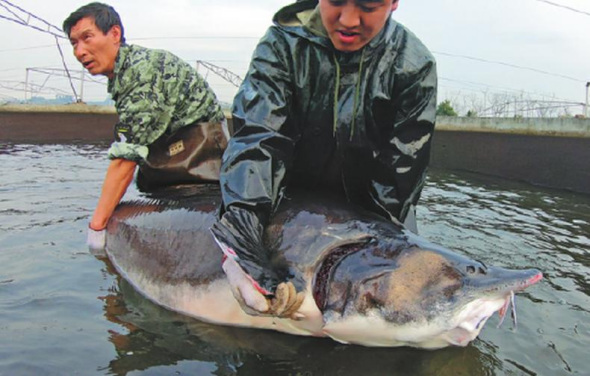
A beluga raised at the Qiandaohu Lake fishing farm of Kaluga Queen. (Photo by Gao Erqiang/China Daily)
Since the dissolution of the Soviet Union in 1991, however, global caviar supply has undergone a drastic decline. The long-established sturgeon and caviar management system gradually weakened, resulting in rampant illegal fishing and habitat degradation.
Today, global caviar production remains steady at around 200 tons a year and largely comes from artificial breeding, as several sturgeon species have been classified as endangered since 2000. The classification resulted in a ban on wild fishing and at the same time triggered commercial breeding to boom.
"It's a lucrative business, but also one that poor people cannot afford to start and rich people disdain to join, considering the investment time required for the fish's maturity and egg production," Xia said.
With an initial investment of around 6 million yuan, mainly from several founding partners, Kaluga Queen harvested its first batch of caviar in 2006 and started to widely market it the following year, when China's food-safety problem was at its peak.
"At first, we were treated with such bias that once they heard it's 'Made-in-China', people would turn us down immediately without opening the can and having a taste," Xia recalled.
After attaining several top winner titles at caviar blind tasting events and exhibitions with its high quality, Kaluga Queen had its first breakthrough, becoming the supplier of Lufthansa's first-class cabins in 2011.
Today, the company is expected to keep a double-digit growth rate, with production reaching 100 tons in 2019. While the growth is seen evenly in both retail and partnership with fine dining restaurants and luxury hotels, Xia thinks there will be growing potential in retail as more Chinese consumers get their first bite of the roe.
"Our strategy is to work with as many restaurants as possible in China, turning them into our tasting rooms to deliver our roes as extensively as possible. Once the foundation is built, we will reduce the retail price, say by 5 percent, to get millions of consumers hooked," he said.
Kaluga Queen is now the exclusive supplier of caviar for around 500 restaurants and hotels in China, but most of them are Western-style restaurants.
"The way and amount of caviar being used in Chinese cuisines currently only represent a tip of the iceberg," said Xia, whose team is now working closely with Chinese fine dining restaurants including Da Dong, the roast duck chain, and Xin Rong Ji, the seafood chain, to develop new dishes using caviar.
Meanwhile, the company's research and development team is also working to use other parts of the fish, including sturgeon fillets, marrows and skin for leather products, though caviar will remain the chief money-spinner for the company, Xia added.


















































